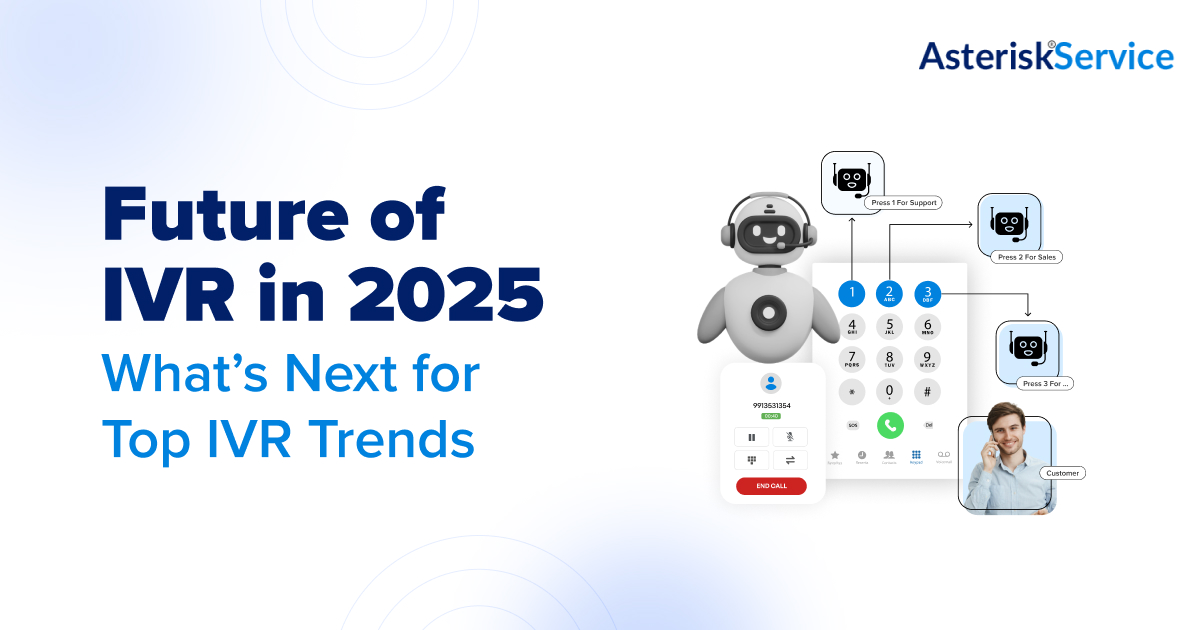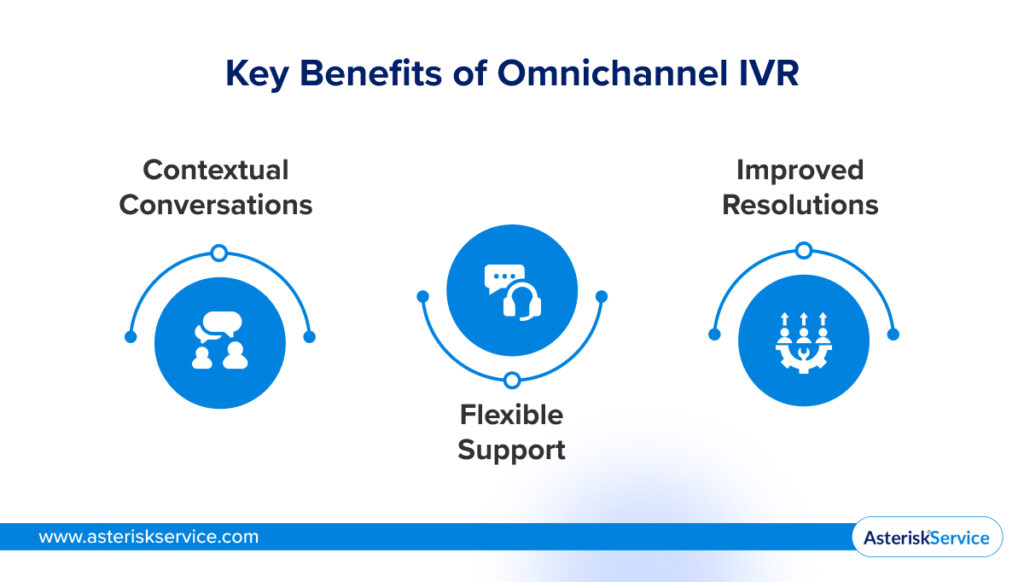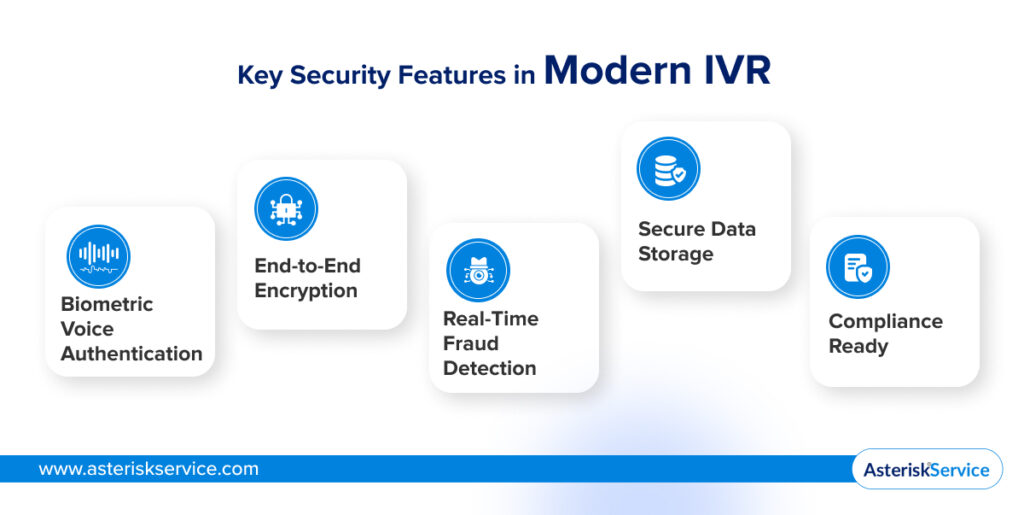
Interactive Voice Response (IVR) systems are advancing rapidly, keeping pace with advancements in technology and the changing expectations of users. Let’s move ahead with an example, calling a business and being greeted by an IVR system that sounds less like a robot and more like a helpful guide who already knows why you’re calling. That’s the future of Asterisk Based CRM Integrated IVR System for Businesses—seamless, intelligent, and surprisingly personal.
By 2025, IVR systems will go beyond handling calls; they’ll be at the heart of customer engagement strategies, leveraging AI, cloud computing, and data-driven insights to redefine the customer experience. Businesses investing in these advancements can expect higher customer satisfaction, improved operational efficiency, and a competitive edge.
The Game-Changing Trends in IVR
IVR systems are undergoing a remarkable transformation, moving beyond basic call routing to become intelligent, adaptive communication tools. These trends are shaping the future of IVR:
- Conversational AI and Natural Language Processing (NLP)
IVRs are evolving into conversational systems powered by Natural Language Processing (NLP), enabling human-like interactions that eliminate the frustration of navigating traditional, rigid menu options. - Predictive Analytics
Future IVRs will analyze customer data to anticipate needs, offering faster resolutions and tailored support. - Omnichannel Integration
Seamless transitions across communication channels ensure a consistent and unified customer experience. - Cloud-Based Solutions
Scalable and flexible cloud IVRs provide businesses with advanced features, cost efficiency, and reliable performance. - Advanced Security Features
Enhanced measures like biometric authentication and encryption safeguard sensitive customer data.
These trends transform IVRs from mere tools into intelligent systems that enhance customer communication.
AI and Machine Learning: The Brainpower Behind IVR
Artificial Intelligence (AI) and Machine Learning (ML) are revolutionizing IVR systems, making them smarter, faster, and more adaptive than ever before. These technologies empower IVRs to not only handle calls but also understand and predict customer needs. Here’s how:
- Understanding Intent
AI-powered IVRs analyze natural language to grasp the purpose of a call, ensuring customers are directed to the right solutions without navigating complex menus. - Personalized Interactions
With ML, IVRs can learn from past interactions, offering customized responses and proactive recommendations tailored to individual preferences. - Automation of Complex Tasks
From resetting passwords to troubleshooting technical issues, AI-driven IVRs can handle intricate tasks without human intervention. - Continuous Improvement
Machine learning allows IVRs to evolve over time, refining their responses and improving accuracy based on caller behavior and feedback. - Seamless Integrations
AI-integrated IVRs work alongside CRM systems and analytics tools, ensuring a holistic approach to customer engagement.
By leveraging the power of AI and ML, IVR systems are no longer reactive tools—they are proactive, intelligent solutions that redefine customer communication.
Omnichannel Communication: Connecting Every Touchpoint
Modern customers expect businesses to recognize and respond to them consistently across channels. Omnichannel communication is a game-changer, enabling IVR systems to serve as the linchpin for unified customer experiences.
Key Benefits of Omnichannel IVR
Omnichannel IVR bridges these touchpoints, ensuring every interaction feels connected and effortless. Here’s how it delivers unmatched value:

- Contextual Conversations: Calls transferred from chat or email retain the conversation history, avoiding repetition.
- Flexible Support: Customers can switch between channels like social media, text, or voice calls without disruptions.
- Improved Resolutions: Access to unified customer profiles enables agents and systems to provide faster solutions.
By adopting omnichannel-enabled IVRs, businesses can improve satisfaction and retention rates while building long-lasting customer relationships.
Cloud-Based IVR: Scalable and Flexible
Cloud-based IVR solutions are redefining communication by combining scalability, cost-efficiency, and advanced capabilities. These systems move beyond traditional setups, offering unmatched flexibility and adaptability to modern business needs.
- Instant Scalability: Cloud-based IVR systems can effortlessly manage high call volumes during peak periods, such as holidays or marketing campaigns, without the need for additional hardware or infrastructure. The ability to scale up or down instantly ensures that customer service remains smooth and uninterrupted, regardless of demand fluctuations.
- Enhanced Features: With seamless integration capabilities, cloud-based IVR can connect to CRM tools, analytics platforms, and APIs, enabling businesses to deliver personalized communication experiences. Advanced features such as real-time reporting, automated workflows, and intelligent call routing improve efficiency and provide valuable insights into customer interactions.
- Cost Savings: Traditional IVR systems require significant upfront investments in hardware and ongoing maintenance costs. In contrast, cloud-based IVRs operate on a pay-per-use model, allowing businesses to optimize expenses by only paying for the resources they use. This approach minimizes financial risks while maximizing operational efficiency.
- Remote Management: Cloud-based IVR solutions enable administrators to manage and update systems from anywhere using a centralized dashboard. This remote accessibility ensures consistent performance across multiple locations, allowing businesses to maintain communication continuity in a globally distributed workforce or during unexpected disruptions.
Cloud-based IVR is the ideal choice for businesses looking to future-proof their communication systems while delivering superior customer experiences.
Personalization and Customer Experience: It’s All About the Caller
Personalization in IVR systems is no longer optional; it’s an expectation. Customers want interactions that reflect their preferences and past interactions. Future IVRs will excel by offering:
- Proactive Assistance: Predict customer needs based on their history and provide immediate solutions.
- Dynamic Menus: Personalized options based on the caller’s specific account or issue.
- Improved Accessibility: Multilingual support and voice-command interfaces will cater to diverse demographics.
This level of personalization doesn’t just resolve issues—it fosters loyalty, turning one-time callers into lifelong customers.
Enhanced Security Features: Safeguarding Every Interaction
As IVR systems handle sensitive customer information, robust security measures are essential. Future IVR systems will prioritize data protection to build trust and ensure compliance with stringent regulations.
Key Security Features in Modern IVR
Here are some of the critical specifications given below:

- Biometric Voice Authentication
-
-
- Verify callers using unique voice patterns, reducing risks of fraud and unauthorized access.
-
- End-to-End Encryption
-
-
- Protect sensitive data like payment processing IVR system details during calls, ensuring secure communication channels.
-
- Real-Time Fraud Detection
-
-
- AI-powered systems monitor interactions to identify and mitigate suspicious activities instantly.
-
- Secure Data Storage
-
-
- Store call recordings and customer information with advanced encryption and restricted access.
-
- Compliance Ready
-
- Adhere to data privacy laws like GDPR and HIPAA, ensuring your IVR systems meet regulatory standards.
By implementing these features, businesses can enhance security while fostering customer confidence in every interaction.
The Future of IVR: Intelligent and Customer-Centric Solutions
IVR systems are no longer just call-handling tools—they’re the backbone of intelligent, customer-centric communication strategies. With advancements in AI, cloud computing, omnichannel communication, and security, IVRs are set to transform how businesses engage with their customers.
Businesses need future-ready solutions that combine scalability, personalization, and security to harness the trends. At asteriskservice, we deliver IVR solutions tailored to your business needs. However, If you’re looking to upgrade your existing system or build a new one, our expertise ensures a seamless transition into the future of IVR. Embrace these trends and redefine your customer communication today.
FAQs
Why does IVR still matter in an AI world?
IVR remains vital because it complements AI as an accessible, scalable tool for automating customer interactions. It streamlines call routing, provides instant responses, and integrates seamlessly with AI for enhanced personalization and efficiency.
What is omnichannel in IVR?
Omnichannel in IVR refers to systems that enable seamless communication across multiple platforms—voice calls, chat, email, and social media. It ensures consistent and contextual interactions, allowing customers to switch channels without losing the conversation flow.
Do customers like IVR?
Yes, when designed well. Modern IVR with intuitive menus, conversational AI, and personalized options are highly preferred by customers as they reduce wait times and resolve issues faster.
How does cloud-based IVR improve scalability?
Cloud-based IVR allows businesses to handle fluctuating call volumes without infrastructure upgrades. Its flexible architecture can scale up during peak times and scale down during low demand, ensuring cost efficiency and reliability.
How can IVR enhance security?
IVR systems enhance security by using biometric authentication, encryption, and real-time fraud detection. These features protect sensitive customer data and help businesses comply with regulatory requirements.